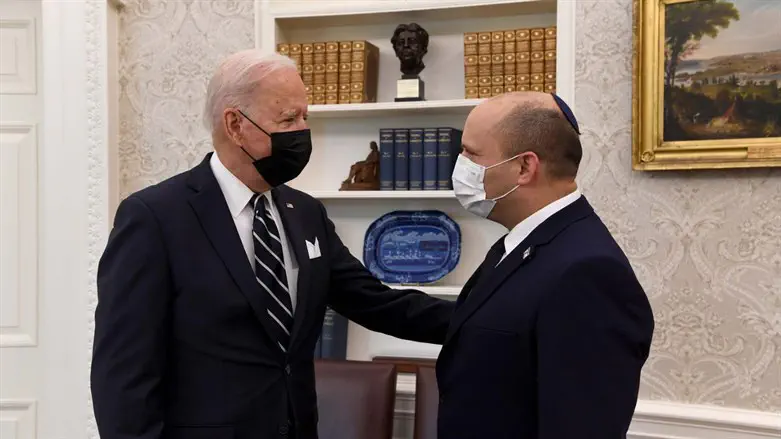
Talk of a Plan B to end the Iranian nuclear threat should efforts to revive the 2015 nuclear deal between Iran and the P5+1 fail was limited to official Israeli statements a few weeks ago.
But Iran’s dithering and reluctance to return to Vienna and resume negotiations clearly contributed to the success of Israeli efforts to convince its American ally of the need for an alternative plan to deal with the Iranian threat.
About a month ago, Israeli Ambassador to the US and the UN Gilad Erdan said that the US and other world powers were considering a Plan B to stop Iran’s nuclear program if the Vienna talks fail. “In the past, the estimate was that there was an 80 percent chance it [Iran] would return to the [2015 nuclear] deal, today that has dropped to around 30%.”
Following this statement, reports have spilled over into meetings between Israeli security and military officials and their American counterparts to consider scenarios to deal with the possibility that the mullahs will continue to dither and gamble to buy time so that they can have every opportunity to advance their nuclear program and present the world with new data and strategic facts.
Indeed, until recently, the Biden administration has stuck to a strategy of imposing new sanctions on the Iranian mullahs’ regime if it refuses to back out of the nuclear deal. But Israel has managed to develop a more effective strategy.
An alternative plan includes significant political, diplomatic, and economic pressure applied jointly by the US, Europe, Russia, and China to force Tehran to return to negotiations, and another plan that includes a military threat if the Vienna talks fail.
Although the Biden administration has largely favored the diplomatic option in dealing with the Iranian nuclear issue to date, the mullahs’ actions have placed the White House in a critical strategic position, to say the least.

President Biden has demonstrated his inability to choose alternative strategic options that preserve the status of the US and its ability to protect its closest ally, Israel. President Biden has demonstrated his inability to choose alternative strategic options that preserve the status of the US and its ability to protect its closest ally, Israel. This has contributed to a rapid rapprochement of American and Israeli positions on common ground. The US can no longer pretend that it is relying solely on diplomacy to deal with the Iranian nuclear threat.
President Biden has demonstrated his inability to choose alternative strategic options that preserve the status of the US and its ability to protect its closest ally, Israel. This has contributed to a rapid rapprochement of American and Israeli positions on common ground. The US can no longer pretend that it is relying solely on diplomacy to deal with the Iranian nuclear threat.
There is a palpable intelligence in Israeli diplomacy in the face of the American position. This is reflected in the approach of the new Naftali Bennett government in dealing with the Iranian nuclear issue. The acute confrontation with the American viewpoint no longer exists as it did under Netanyahu.
The idea of an absolute rejection of the nuclear deal and the tendency to stand on common ground with the US point of view has even turned into the opposite. Israel has recognized that the deal in its current form is unlikely to be revived given Iran’s current hard line.
Ibrahim Raisi and his negotiators have overplayed their hand; they can only get out of this situation if they get a major waiver from the US, like lifting sanctions on Iran before agreeing to a return to the nuclear deal, something that will be difficult for the White House to respond to.
The success of this Israeli strategy has been swift because the Biden administration has not completely abandoned the military option for dealing with Iran if the nuclear deal fails.
The US came out to talk, however tentatively, about Plan B and other options on the table, including the military option, as the Israeli foreign minister said at a joint press conference on “alternative options” after his US counterpart’s speech. “I think the whole world understands what the other options are,” Yair Lapid had said.
It is true that the US continues to show some restraint and caution when it comes to increasing pressure on the mullahs, fearing that this would strengthen their stubbornness and lead to an acceleration of the development of their nuclear program. But this reticence may not last long if the Iranians continue to delay their return to the Geneva talks.
Moreover, it is difficult to bet that negotiations will lead to a positive outcome. Certainly, at this point, the evolution of the chances of the alternative plan to address the Iranian nuclear threat depends on the behavior of the Iranian mullah regime, which is sending mixed signals about the negotiations and betting heavily on brinkmanship.
But this gamble seems risky and is doing much to push the crisis toward the point of no return.
Dr. Salem AlKetbi is a UAE political analyst and former Federal National Council candidate